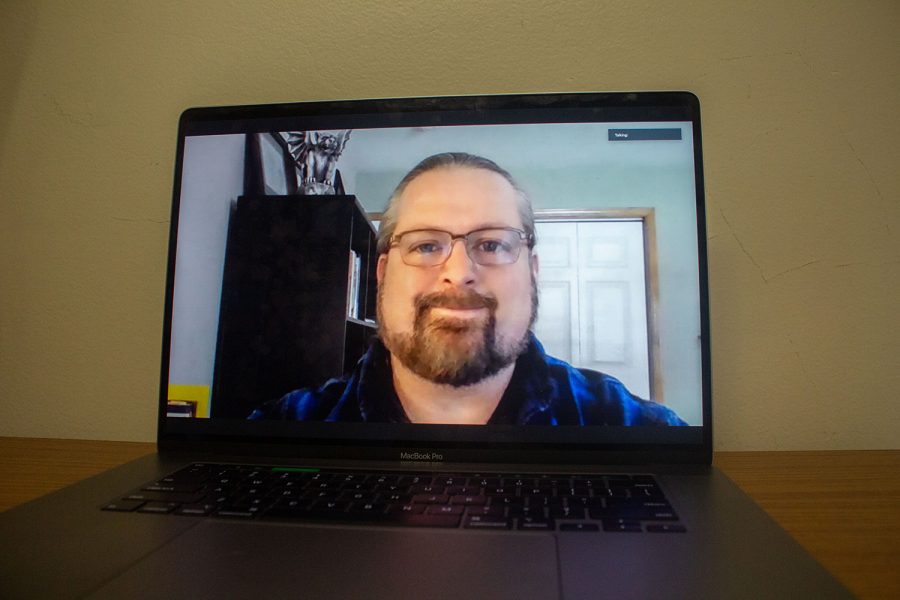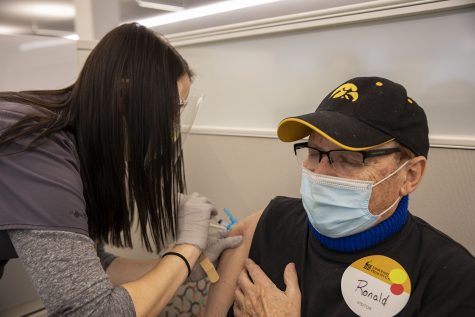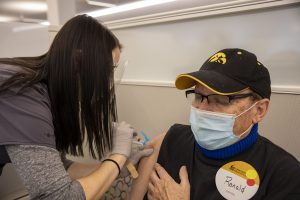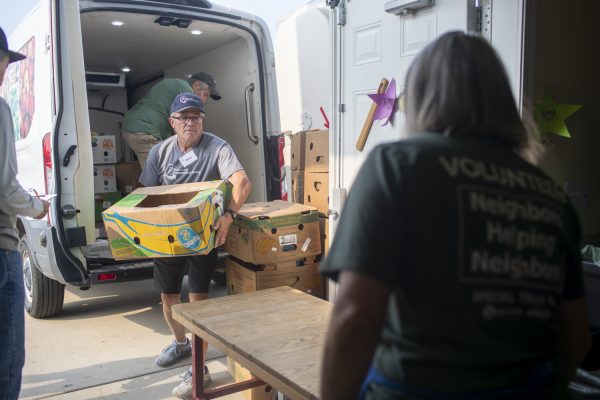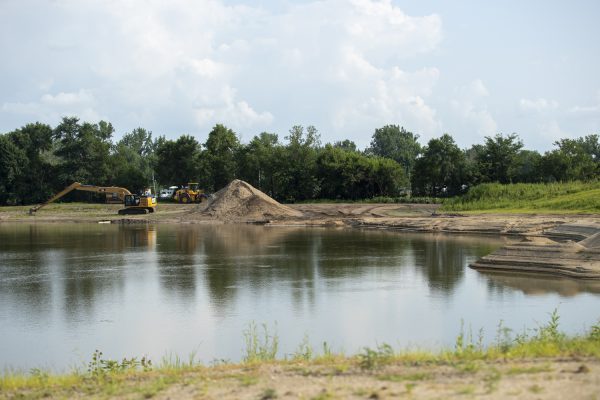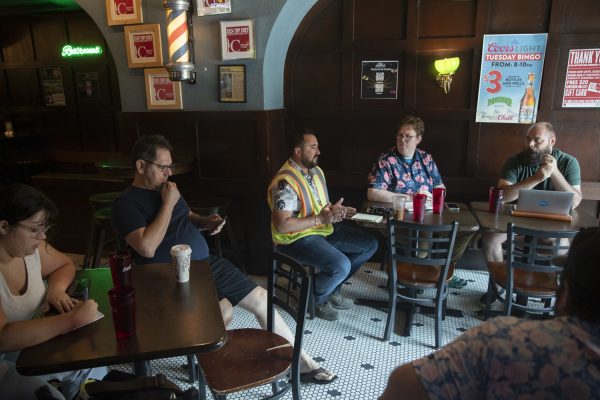University of Iowa psychologists recommend how to deal with kids stress during the pandemic
Children have experienced stress and anxiety after almost a year of isolation from COVID-19.
An Iowa City resident with two kids in school and Visiting Assistant Professor of Communication Studies at Coe College, Shawn Harmsen, poses for a portrait over zoom on Feb. 1.
February 3, 2021
When Shawn Harmsen was growing up, he was used to seeing tons of old coffee cans and plastic containers in his grandma’s basement saved as evidence of the effects of living through the Great Depression. In 10 to 20 years, he said COVID-19 also will be an experience with lingering effects that everyone can reflect upon.
“You know, as they look back on this, when they, you know, get older, and I’m sure they’ll do the thing that all parents do,” Harmsen said. “They will say, ‘when I was a kid, I had to stay home for a year and a half because of COVID-19.'”
Harmsen’s wife is a family medicine doctor who works in emergency rooms in Iowa. Their family has had to be careful throughout the COVID-19 pandemic because of the nature of her job’s higher COVID-19 risk.
Their children, ages 12 and 14 who attend middle and high school in the Iowa City Community School District, chose 100 percent online instruction, he said.
“Even though [my wife is] very careful and just got her second shot, we are protecting ourselves, but also recognizing the responsibility to protect others,” Harmsen said. “They’ve been doing OK, in terms of their school, so that’s been good. But they miss their friends.”
University of Iowa Assistant Professor Isaac Petersen, who works in the Department of Psychological and Brain Sciences, said recruitment and in-person data collection in a longitudinal study that follows children and families over time has had to be postponed because of the pandemic.
He said valuable time has been lost to observe children’s development during COVID-19.
“The pandemic has affected so many people. However, different people have been impacted in different ways… inadequate educational opportunities and insufficient availability of childcare are among the ways in which children have been most greatly impacted. Children have also lost family members to the pandemic,” Petersen wrote in an email to The Daily Iowan.
Harmsen’s family lost their grandmother three weeks before Christmas. Harmsen said it has caused his children stress and anxiety.
“When you’re a kid, the biggest fear you have is the people you care about, parents and grandparents, passing away,” Harmsen said. “To have a family member actually pass away from COVID makes it that much more real, so they understand why they’re home.”
Sonya Stanerson, an elementary counselor at Highland Elementary School, said the guidance staff offered classroom guidance to every student in the building once a week from August to October during COVID-19. She said Highland Elementary School has had a mix of in-person, hybrid, and online curriculum this year. In a virtual setting, Stanerson has made online lessons for her students about topics like worrying to review with their parents.
From research on the pandemic so far, Petersen wrote that we can’t know the long-term psychological effects of the pandemic on children.
He added that for some children, long-term consequences may be tied to basic needs that go unmet, like insufficient food or shelter.
“Inadequate academic experiences may impair their ability to learn key academic skills such as reading, math, and writing skills that are important for so many occupations,” Petersen wrote. “For other children, insufficient opportunities to interact, play, and socialize with peers may impair the ability to develop important socio-emotional skills such as communication skills, self-control, perspective-taking, and empathy.”
Stanersen said when parents don’t fully know what to do in situations like the COVID-19 pandemic, she suggested reaching out to their child’s school or family relatives.
“I think it is important to lend an ear and listen to your children. Let them guide the way,” she said. “Similar to grieving a loss or death, let them explain what they need and listen to them. I think during this time we need to learn to be OK with working together.”
According to the Iowa’s Area Education Agency in a letter from Iowa educators, parents can help their children during the pandemic by meeting their basic needs first, creating a space to talk about stressors, and slowing down and enjoying little things to reconnect with them.
Harmsen said his children have changed the way they engage in their extracurriculars during COVID-19, such as taking private gymnastic lessons versus in a group or connecting online via Xbox video games to avoid total isolation.
“We try and do things occasionally with a few friends, families that we trust,” Harmsen said. “Yesterday, my kids went sledding. So just outdoor activities where they can keep social distancing.”
Petersen wrote that the short-term consequences of the pandemic for children could include greater stress, anxiety, health-related issues for the child and their family members.
He added that less face-to-face interaction with others could be a negative effect.
“Parents are doing the best that they can. And, children are often resilient. So, I’m hopeful that we will make it through this,” Petersen wrote.
Harmsen said there are some “silver lining” and lessons that his family has learned about resilience, adaptability, and sacrifice for others during the COVID-19 pandemic.
“The kids are resilient at the same time. They haven’t been happy about the pandemic. They understand it and they get it, but they can’t wait for this to be over and they’re sick and tired of it,” he said.



